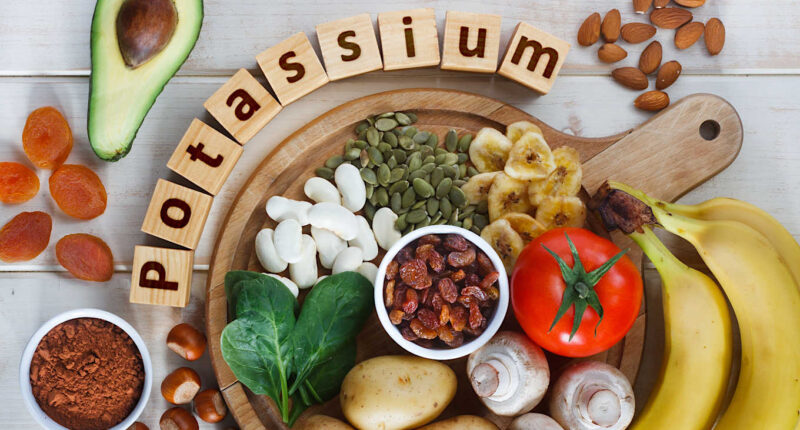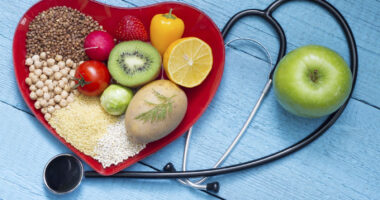Potassium plays a vital role in maintaining proper bodily functions by regulating fluid balance. It plays a significant role in reducing the risk of high blood pressure, stroke, and kidney stones. It is important to consume an adequate amount of potassium-rich foods to fulfill your daily requirements.
Potassium often goes unnoticed despite being a crucial mineral. It is essential for the optimal functioning of cells, maintaining fluid balance, supporting nerve and muscle function, and numerous other vital processes.
Ensuring an adequate intake of potassium through your diet is of utmost importance. To help you with that, here is a list of the top 16 potassium-rich foods that you should include in your meals to reap their benefits.
16 Foods High in Potassium
Here are 16 foods that are high in potassium:
- Apricots
- Lentils
- Acorn squash
- Prunes
- Raisins
- Potatoes
- Kidney beans
- Orange juice
- Soybeans
- Bananas
- Milk
- Spinach
- Chicken breast
- Yogurt
- Salmon
- Beef
Apricots
Apricots deliver a substantial amount of potassium. Just a 1/4 cup of dried apricots provides a whopping 465 mg of this essential mineral.
And that’s not all there is to apricots! They are also abundant in fiber, vitamin A, and antioxidants. You can enhance the nutritional value of your yogurt, oatmeal, or desserts by incorporating apricots into them. Moreover, they serve as a convenient snack option when you’re on the move.
Lentils
Make way for lentils as they prove that plant-based protein can be just as formidable as meat! These legumes boast not only an impressive protein content but also a rich supply of potassium, fiber, and iron. A mere cup of cooked lentils offers a substantial 731 mg of potassium, along with high levels of fiber, protein, and iron.

The beauty of lentils lies in their affordability, versatility, and delightful taste. They can be incorporated into a wide array of dishes, ranging from soups and stews to salads and burgers. So go ahead and make the most of lentils to elevate the nutritional value and flavor of your meals.
Acorn squash
Acorn squash offers various culinary possibilities, such as roasting, mashing, or even serving as a nutritious substitute for fries. Despite its petite size, this winter squash is bursting with a delightful sweet and nutty flavor, while also being rich in fiber, vitamins, and minerals.
A single cup of cooked acorn squash yields an impressive 896 mg of potassium. Furthermore, it serves as an excellent source of vitamin C, which plays a crucial role in fortifying the immune system and safeguarding the skin against the damaging effects of free radicals.
Prunes
Prunes may not always be in the spotlight, but these dried plums truly deserve more appreciation, particularly for their potassium content. These fruits are a potent source of potassium, delivering an impressive 293 mg per 1/4 cup serving. Not only that, they are also abundant in fiber, vitamin K, and antioxidants, making them a valuable addition to any nutritious diet.
Let’s not overlook the digestive benefits of prunes either. They have long been recognized for their ability to promote regularity and maintain a healthy gut. By incorporating prunes into your snack routine, you can simultaneously increase your potassium intake and support digestive well-being. It’s a win-win situation!
Raisins
Raisins, also known as dried grapes, are packed with fiber, antioxidants, vitamins, and minerals. Although they may not boast a glamorous reputation, they are a convenient snack and a versatile ingredient that can be incorporated into both sweet and savory dishes.
It’s important to be mindful of portion sizes when enjoying raisins since they are naturally high in sugars, and it’s easy to consume them excessively. However, a serving of 1/4 cup provides a substantial 298 mg of potassium, making them a worthwhile investment in terms of caloric intake.
Potatoes
It’s hard not to love potatoes! They are not only delicious but also rich in nutrients. Just one medium-sized baked potato contains a whopping 926 mg of potassium. That’s impressive!
But the benefits of potatoes don’t stop there. They are also a great source of fiber, vitamin C, and various other nutrients. However, it’s important to be mindful of how you prepare them. Adding excessive amounts of butter, sour cream, or other high-fat toppings can quickly transform this healthy vegetable into a high-calorie indulgence.
Kidney beans
A generous serving of canned kidney beans, amounting to one cup, provides an impressive 607 mg of potassium. These beans are not only rich in potassium but also packed with essential nutrients. Their versatility allows them to be used in various dishes, including soups, stews, and salads.
In addition to their traditional uses, kidney beans can be mashed with spices to create a protein-packed spread, perfect for toast or bread. Let’s not forget about their role in classic dishes like chili or bean burgers, where they add both flavor and nutritional value.
Orange juice
One of the timeless breakfast favorites, a cup of orange juice, offers a substantial 449 mg of potassium. Not only that, but it also contains valuable nutrients such as vitamin C, folate, and a variety of antioxidants.
However, it’s important to make mindful choices when selecting orange juice, as many commercially available brands are laden with added sugars. To ensure that your orange juice remains a healthy and potassium-rich choice, opt for freshly squeezed juice or 100 percent pure orange juice without any added sugars or preservatives. By doing so, you can enjoy the benefits of this nutritious beverage without unnecessary additives.
Soybeans
Soybeans, packing an impressive 443 mg of potassium per half-cup serving, provide essential fuel for your muscles and keep your nerves functioning optimally. Additionally, these little legumes are a protein powerhouse.
To incorporate more soybeans into your diet, consider adding them to salads, stir-fries, and soups. They also make a great meat substitute in dishes like veggie burgers or tacos. Another option is tofu, which is derived from soybeans and offers both potassium and protein. Tofu can be grilled, baked, or scrambled to suit your taste preferences while providing a nutritious boost to your meals.
Banana
A delicious medium-sized banana not only provides a notable 422 mg of potassium but also offers other appealing benefits. Bananas are an excellent source of fiber, vitamin C, vitamin B6, and antioxidants, making them the ultimate go-to snack for individuals with busy lifestyles.
If you’re seeking a different way to enjoy bananas, try inserting a popsicle stick, dipping them in melted chocolate, and freezing them for a delightful potassium-packed treat on a hot day.
However, it’s essential to maintain moderation when consuming bananas. While they are nutrient-rich, they are also relatively high in natural sugars and calories. So, remember to enjoy them in moderation to balance their nutritional benefits.
Milk
Not only does 1% milk taste delightful and offer a low-fat option, but it also serves as a surprising source of potassium. With approximately 388 mg of potassium per cup, along with calcium, magnesium, and zinc, incorporating 1% milk into your diet is an effortless way to enhance your mineral intake.
You can add it to smoothies, coffee, tea, or even include it in your post-workout recovery drink. Furthermore, 1% milk can be utilized as a base for homemade soups or sauces, maximizing its versatility and nutritional value.
Spinach
Spinach, the superhero among leafy greens, is truly a powerhouse of nutrition. Not only is it brimming with a wide range of vitamins and minerals, but it also serves as an excellent source of potassium, just as Popeye would approve. In fact, by consuming 2 cups of raw spinach, you can easily obtain 292 mg of potassium.
But that’s not all! Spinach is also abundant in iron, a vital mineral responsible for oxygen transportation in the blood and supporting a healthy immune system. So, whether you choose to incorporate spinach into your smoothies or enjoy it in other dishes, you can reap its impressive potassium and iron content along with its array of nutritional benefits.
Chicken breast
Chicken breast is a lean and efficient protein source that often finds its place in healthy diets. With 242 mg of potassium in a 3-ounce serving, it serves as a fantastic source of this essential mineral. Furthermore, chicken breast is low in fat and calories, making it an excellent option for individuals focused on weight management.
One of the many advantages of chicken breast is its versatility in various recipes. Whether you’re preparing stir-fries, salads, soups, or sandwiches, the possibilities for enjoying this lean and nutritious meat are endless.
However, it is crucial to handle and cook chicken safely to reduce the risk of foodborne illnesses. Taking appropriate precautions during preparation and cooking is essential for ensuring food safety.
Yogurt
If you’re searching for a delicious and potassium-rich snack, look no further than yogurt. Enjoying a 6-ounce serving of yogurt can provide a potassium boost of approximately 398 mg. Alongside its potassium content, yogurt offers valuable calcium, protein, and gut-friendly probiotics, making it a creamy and nutritious treat.
Besides savoring yogurt on its own, you can enhance its snack appeal by adding your favorite fruits, nuts, or even chocolate bits. Additionally, yogurt can be used as a base for creamy dips and dressings, adding both flavor and nutritional value to your meals.
For those who prefer a plant-based option, there are plenty of vegan yogurts available made from soy milk. These alternatives also provide potassium, offering a suitable option for individuals seeking dairy-free options.
It’s important to note that soy yogurt generally has lower potassium levels compared to regular cow’s milk yogurt.
Salmon
Salmon, a delicious and fatty fish, is not only bursting with flavor but also ranks among the most nutritious foods available. It stands out as an excellent source of potassium, with approximately 534 mg per 3-ounce serving. Consuming salmon is a fantastic way to support healthy muscle and nerve function. Moreover, it offers a wealth of B vitamins and omega-3 fatty acids, which are heart-healthy fats known for reducing inflammation and supporting brain health.
If the cost of fresh salmon poses a concern, don’t fret! Canned salmon serves as a more budget-friendly alternative that provides similar benefits. It can be used in salads, spreads, or patties, offering a quick and convenient meal option that is just as nutritious as fresh salmon.
Beef
Are you craving beef? It might be worth considering with its potassium content of 300 mg per 3-ounce serving. Beef not only delivers a delicious and versatile source of protein but is also packed with other vital nutrients like iron, zinc, and vitamin B12. These nutrients play crucial roles in maintaining healthy red blood cells, supporting immune function, and promoting optimal brain health.
To make healthier choices, opt for lean cuts of beef, such as sirloin or round steak. When cooking, use methods like grilling, baking, or broiling, as they help preserve the nutrient content of the beef while managing calorie intake.
Benefits of Potassium
Potassium plays a pivotal role in cellular function by ensuring the appropriate fluid levels within cells, while its companion mineral, sodium, regulates fluid balance outside of cells. In addition to fluid balance, potassium offers numerous other benefits, including:
– Maintaining healthy blood pressure levels.
– Supporting proper nerve and muscle function.
– Preventing muscle cramps and weakness.
– Potentially reducing the risk of stroke and heart disease.
– Promoting optimal bone health.
– Assisting the body in maintaining a healthy pH balance.
– Potentially reducing the risk of kidney stone formation.
– Supporting healthy digestion.
– Aiding the body in converting food into energy.
– Potentially reducing the risk of osteoporosis after postmenopause.
These benefits highlight the importance of maintaining adequate potassium levels for overall health and well-being.
How much Potassium Do You Need?
Understanding the recommended potassium intake is crucial. The adequate intake (AI) of potassium varies based on factors such as gender and life stage. For adult males, the AI is 3,400 mg per day, while for adult females, it is 2,600 mg. Pregnant individuals are advised to aim for 2,900 mg, and those who are chestfeeding require around 2,800 mg daily. However, it’s important to note that these are general guidelines, and individual needs may differ based on age, activity level, and overall health.
Unfortunately, many Americans fail to meet these recommended levels, with an average intake of approximately 2,496 mg per day. Diets that are high in processed, sugary, and fatty foods often lack sufficient potassium and other vital nutrients, putting individuals at risk of deficiencies. To address this, it’s advisable to prioritize potassium-rich whole foods such as vegetables, fruits, and meats in meals and snacks, rather than opting for less nutritious options. By doing so, it becomes easier to meet the recommended potassium intake and support overall health and well-being.
Can You Eat Too Much Potassium?
Although potassium is vital for health, it is possible to have too much of it. However, for individuals with normal kidney function, overdosing on potassium from food is highly unlikely because the excess is excreted through urine. This is why experts have not established an upper safe limit for potassium intake, as there is no evidence to suggest that food alone can cause an overdose of potassium.
However, individuals with kidney problems may face challenges in efficiently eliminating excess potassium from their bodies. This can lead to a buildup of potassium in the blood, known as hyperkalemia, which can result in serious health complications like irregular heart rhythms or cardiac arrest. Therefore, individuals with kidney issues should be cautious about their intake of potassium supplements and salt substitutes, as these can contribute to elevated potassium levels.
It’s important to consult with a healthcare professional if you have any concerns about your potassium intake, especially if you have kidney problems or are using potassium supplements or salt substitutes. They can provide personalized guidance based on your specific health needs.
Takeaway
Potassium is a vital nutrient that plays a critical role in maintaining overall health and well-being. Its importance lies in regulating fluid balance, blood pressure, as well as supporting proper muscle and nerve function.
The good news is that incorporating potassium-rich foods into your diet is both delicious and achievable. Start your day by adding apricots and prunes to your morning porridge for a nutritious boost. For dinner, try grilling salmon and baking potatoes to enjoy the potassium they offer. When you need a quick snack, reach for a handful of raisins. The options are plentiful!
To meet the recommended daily intake, aim for around 2,600 mg of potassium for females or 3,400 mg per day for males. Remember to diversify your food sources to ensure you receive a wide range of nutrients in your diet. By doing so, you can maintain a balanced and nourishing eating plan.









